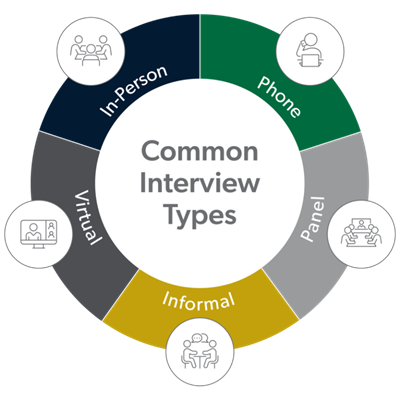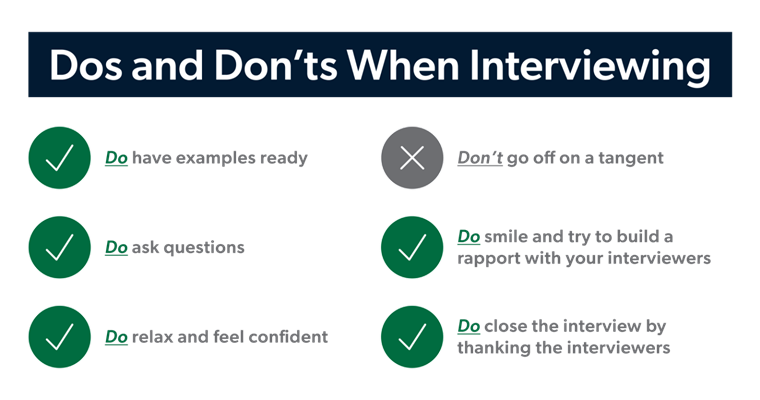Article
Making sure you’re successful in a job interview often comes down to preparation, practice and clear communication.
Fortunately, there are some simple techniques you can leverage when approaching five common interview scenarios that are not only helpful to know but will also prepare you to go into different types of interviews with confidence.
Polishing up on your responses to common interview questions and general interview skills prior to a job interview is always a good idea. But before you do, it's good to know the type of interview you’ll be participating in and the context in which you are meeting your potential future employer.
There are several different types of interviews but five common types to be familiar with are in-person interviews, phone interviews, virtual interviews, panel interviews and informal interviews. Each one has a unique atmosphere, but all aim to answer the same question for a hiring manager: Are you a good fit for the role?
In-person interviews are the most common format used by employers when considering candidates. They are typically held in the workplace and give an interviewer the opportunity to learn more about you, your experience and skills, and assess if you’d be a good fit for the job you applied to.
These interviews tend to be formal, so take time to prepare accordingly. In addition to being ready to answer questions pertaining to your resume and experience, you should also research the company you’re interviewing for, the role you applied to and have questions prepared to ask the interviewer at the end. Considering your attire is also a must to ensure you come across polished and professional.
When answering questions, make sure to make eye contact, be polite and speak confidently and slowly. Practicing answers to commonly asked questions — especially behavioral interviewing questions — is a great way to help you not only feel more comfortable but also ensure that you’re sharing the information and experience you want the interviewer to know about you.
Phone interviews tend to also be relatively formal and are often conducted in the same manner as an in-person interview. This format usually involves one interviewer at a time, though a potential employer may have you participate in several different phone interviews with different people throughout the course of the hiring process.
Questions asked in phone interviews also typically stay focused around your experience and skills, but the major challenge with this format is communicating your message without physical cues, like eye contact and gestures. Your tone of voice on the phone is critical, so speak with confidence and be careful not to speak too quickly or for too long. An old sales trick is to smile while you are speaking — it helps inject warmth and positivity into your voice.
Another great way to ensure you stay on track when responding to questions is to have notes to reference during the call. While you never should be reading anything verbatim or sound too rehearsed, having a few bullets about information you want to mention can help you deliver thoughtful responses. Having notes around some commonly asked questions can also eliminate the need to “think on the fly” and can help you feel more natural when responding.
Finally, when participating in a phone interview, make sure you find a quiet place where you can focus and limit distractions so the focus of your call can stay on your conversation.
Virtual interviews are used more commonly today than ever before. They are a great way for employers to gain information about a candidate, even if they’re not local, and are typically conducted using video conferencing tools rather than taking place in person. Much like an in-person interview, virtual interviews tend to be formal so your preparation, practice and how you present (including attire) should be the same.
But while many elements of a virtual interview are the same as an in-person interview, there are a few additional factors to consider. Similar to a phone interview, it’s important to find a quiet location and minimize distractions (including anything that might be behind you and on camera during the interview) so you and the interviewer can connect without disruptions.
It’s also important that you find out — and test — what technology tool of the video conferencing platform is being used so you can make sure it’s compatible with your computer.
Informal interviews can be very deceptive if you’re not prepared for the scenario you’re entering. If you're invited for a casual coffee catch-up, don’t take that to mean you can present yourself other than how you’d be at work.
The usual interview rules still apply in an informal interview, so don't let the interview morph into a social chat. While you should focus on building rapport, you still need to get your message across. You want to leave the interviewer with not only a good feeling about you personally, but your abilities and experience within the context of the role you’re interested in.
Panel interviews are typically very formal and can consist of up to four interviewers at one time. This type of format can feel a bit daunting but focus on one question at a time. Address the person who asked the question and as you answer, but still make eye contact with each panel member.
Knowing the names and titles of the panel interviewers ahead of time will also help you feel more comfortable with who you are meeting with and possibly give you an idea of the types of questions they may ask based on their area of responsibility.
Across all of these different types of interviews, the most common interview method leveraged is known as behavioral-based interviewing — or behavioral interviewing — and is a practice you should be familiar with.
Behavioral interviewing is designed to examine your competency, skill compatibility and cultural fit for the position and you will be prompted to provide examples that illustrate your ability to carry out certain skills or demonstrate certain behavior.
Often questions will start with phrases such as "Tell me about a time when…" or "Give me an example of…" To answer these questions successfully, you need to prepare a list of strong and positive examples of your experience that demonstrate your relevant job skills.
Using the STAR method to answer questions is a great way to ensure the information you share pieces together a full picture for the interviewer about a scenario you navigated.
The STAR format is your 'cheat sheet' to structuring effective examples and successfully answering behavioral questions (S: Situation, T: Task, A: Action, R: Result)
Regardless of the format for your upcoming job interview, you want to be prepared, practiced and ready to carry out a thoughtful conversation that highlights your strengths and allows an interviewer to see why you’re the best candidate for the job.
Here are a few key takeaways to keep in mind for your next interview:
Interested in speaking with a recruiter about the interview process? Connect with an experienced Aston Carter recruiter today or search our job board to find your next job opportunity.
*This article was originally developed by Aston Carter EMEA and adapted for Aston Carter North America.


